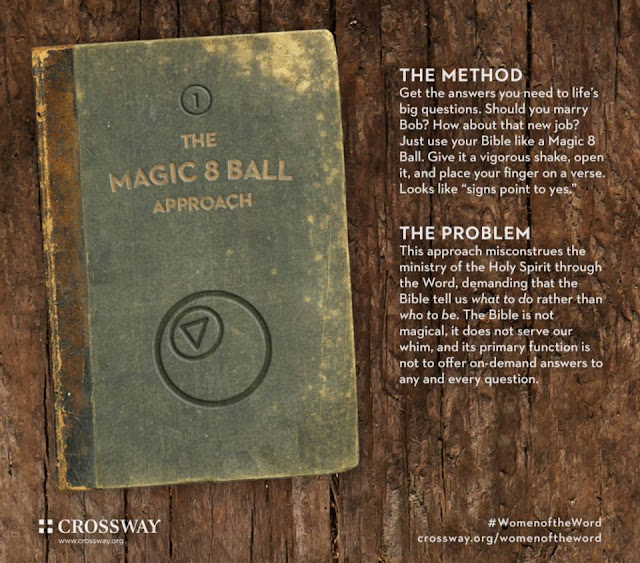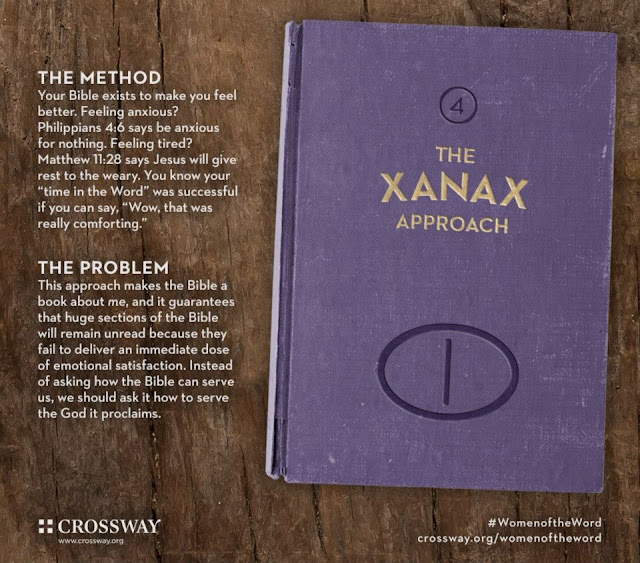I found this infographic on Pinterest and I decided to share it here. The infographic is linked to an article by Crossway
The images draws from chapter 2 of Jen Wilkin's book, Women of the Word: How to Study the Bible with Both Our Hearts and Our Minds, and highlights 6 common—yet ultimately counterproductive—approaches to "studying the Bible" that we all struggle with from time to time. These unhelpful habits sometimes prevent us from really digging into what God has to say to us in his Word.
How true are these to you?
1. THE MAGIC 8 BALL APPROACH
The Method
Get the answers you need to life's big questions. Should you marry Bob? How about that new job? Just use your Bible like a Magic 8 Ball. Give it a vigorous shake, open it, and place your fingers on a verse. looks like "signs point to yes"
The Problem
This approach misconstrues the ministry of the Holy Spirit through the Word, demanding that the Bble tell us what to do rather than who to be. The Bible is NOT magical, it does not serve our whim, and its primary function is not to offer on-demand answers to any and every question.
2. THE PERSONAL SHOPPER APPROACH
The Method
Want to know what the Bible says about a topic like self-esteem or how to be a godly woman? No problem. Just let {insert name of famous Bible teacher here} do the legwork for you. Your personal shopper will hand-select the perfect verses for you from all over the Bible.
The Problem
While helpful to an extent, this approach doesn't help us build "ownership" of Scripture. We ricochet from passage to passage, gaining fragmentary knowledge of many books of the Bible but mastery of none. They're valuable as a supplement to-but not a substitute for- studying the Bible in its most basic sense.
3. THE TELEPHONE GAME APPROACH
The Method
Instead of reading the Bible itself, use your "quiet time" to read books about the Bible. It takes less time and effort to read what someone else says about what the Bible says. And it feels safer to read someone else's conclusions than to draw our own.
The Problem
Its never good to spend more time reading a text several times removed from Scripture than we spend reading Scripture itself. It can render us more likely to quote John Piper than the apostle Paul. We're called to love the Lord our God with all of our minds, not someone else's mind.
4. THE XANAX APPROACH
The Method
Your Bible exists to make you feel better. Feeling anxious? Philippians 4:6 says be anxious for nothing. Feeling tired? Matthew 11:28 says Jesus will give rest to the weary. You know your "time in the Word" was successful if you can say "Wow, that was really comforting".
The Problem
This approach makes the bible a book about me, and it guarantees that huge sections of the Bible will remain unread because they fail to deliver an immediate does of emotional satisfaction. Instead of asking how the Bible can serve us, we should ask it how to serve the God it proclaims.
5. THE PINBALL APPROACH
The Method
Not sure what to read? Just turn to a random passage. It's all good! Releasing the plunger of your good intentions, send the pinball of your ignorance hurtling towards whatever verse it may hit, ricocheting around to various passages "as the Spirit leads".
The Problem
The Bible is a piece of carefully crafted literature and was not written to be read this way. This approach gives no thought to the cultural, historical, and textural background or the original intent of the passage in question- preventing is from really learning what it's about.
6. THE PICKY EATER APPROACH
The Method
Dont worry about reading the Old Testament- it's weird. Well, maybe Esther, Ruth and Proverbs 31 because they're written for women. Other than that, just stick with the good ole New testament...except for Revelation, of course (super weird). the important thing is to be able to identify with what you're reading, so eat what you like and leave the rest.
The Problem
This approach ignores the fact that all Scripture is God-breathed and profitable. We need historical narrative poetry, wisdom literature, law, prophecy, and parables - all showing us the character of God from different angles. And we need to see the gospel from Genesis to Revelation.

.png)















No comments:
Post a Comment